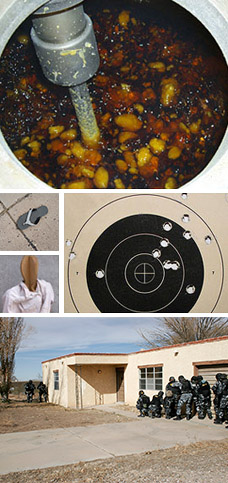
e to bombing incidents. Uti
lization of case stud
Email: ies as well as a tableto
p exercise reinfor
Fax:ces course m
aterial. Par
The Rocket Test Site Facility (RTSF) has two engine test stands, one rated for 8,000 lbs of thrust and the other for 80,000 lbs of thrust. The 80K thrust test stand is now set up for both ticipants will use their training to participate in operational and command level discussions related to techniques and considerations for scene assessment, triage, treatment and stabilization. The course will enable participants to: Identify Terrorist Targets. Understand Explosives and Characteristics. Identify pre-Attack Indicators Associated with a Bombing Incident. Recognize Bombing Incident Related Injury Patterns and Treatment. Understand and Apply a variety of Triage Systems. Identify Pre and Post Detonation Considerations. Identify Strategic and Command Considerations. Identify Tactical and Operational Considerations. Recognize and Unde
rstand Res our and ce Management options. Scope of Course New Mexico Tech and The National Emergency Response and Rescue Training Center (NERRTC) on behalf of the Department of Homela
nd Security (DHS) Federal Emergency Management Agency (FEMA) National Preparedness Directorate have developed courses as part of the National Domestic Preparedness Consortium's curricula to improve the abilities of jurisdictions to combat domestic terrorism. The courses provide training to first responders at the awareness, operations, technician, or incident command levels. Medical Preparedness and Response for Bombing Incidents an operations level course, is one of several taught by New Mexico Tech (NM
T) RTSF has been developed to be as self-contained as possible, using support equipment such as component cleaning equipment for and the Texas Engineering Extension Service (TEEX) and funded by The U.S. Department of Homeland Security. Target Audience The course is designed to assist a jurisdiction in developing an integrated healthcare team capable of planning for and responding to a bombing incident. The primary audience consists of first responders and first receivers throughout the jurisdiction and surrounding areas.RTSF Additional participants may include other professional representatives who might be involved in re
sponse to a b
ombing incident to include law enforcement, public health, and emergency management staff. If desired, personnel from other city, county, state and federal EMS agen can best fulfill those needs. Future projects may include testing of engines that use cies located within the jurisdiction may als
o attend the course. Maximum class enrollment - 30 Minimum class enrollment - 24 Jurisdictional Support and Coordination Requirements Each jurisdiction scheduling a course must organize participants and supply other personnel and equipment support Personnel One primary point of contact (POC) with ability to provide phone
, pager, fax, and e-mail for coordinating all course scheduling and administrative support. A maximum of 30 course participan

